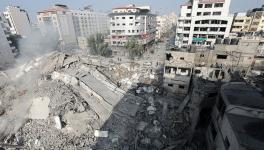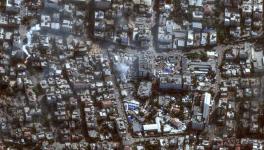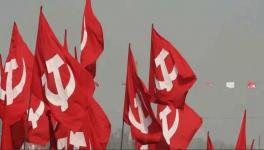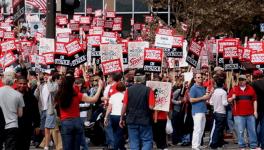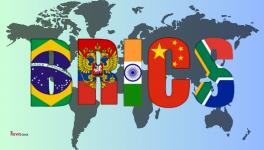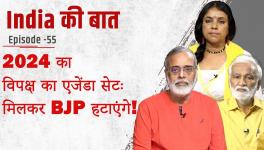Bloody Events in Egypt
Egypt is on the boil again. Events marked by bloody massacres have rocked the country recently. Prof Aijaz Ahmad, senior political analyst speaks to Newsclick on the developments taking place in Egypt. He says the Muslim Brotherhood has vastly overread its popularity and its mandate and underestimated the army. There were no attempts made to address the economic crisis facing the country which had severely effected the everyday lives of the people. Instead, the Muslim Brotherhood was bending to the IMF's conditions. Prof Ahmad feels that the one party State that is Egypt had also not delivered in terms of welfare measures to the people and there were no attempts at democratisation at all.
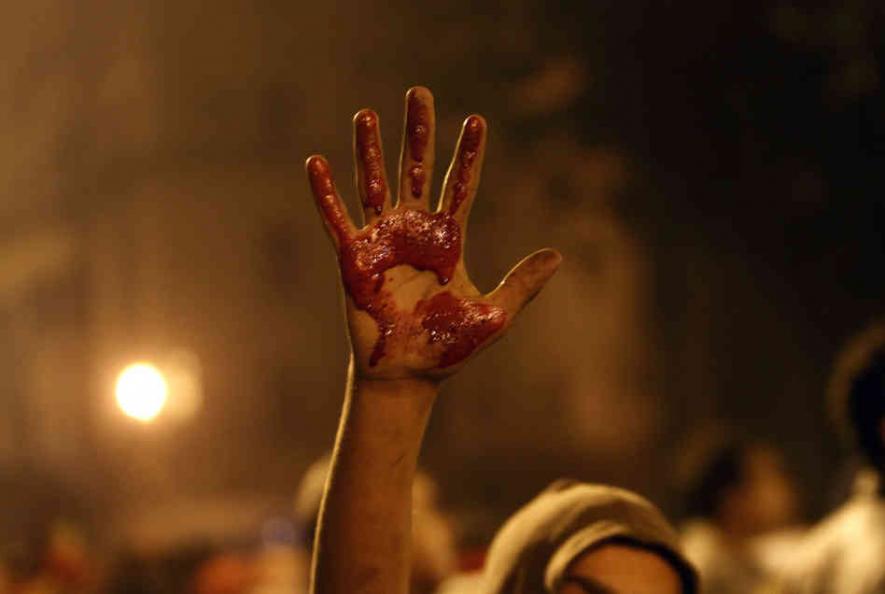
Transcript:
Prabir Purkayastha (PP): Hello and welcome to Newsclick. Today we have with us Prof. Aijaz Ahmad and we are going to discuss the bloody events in Egypt that have taken place recently. Aijaz, it does look like the army is on top and lot of the old regime has re-emerged with the fall of Morsi government. How do you read the basic emergence of this army rule currently?
Aijaz Ahmad (AA): I think what happened is, one of the things is, the Muslim Brotherhood, I think, vastly over-read both their popularity and the level of mandate that they had. They also, I believe, thought that they were now so powerful that the military elite could be pushed into a corner and they could proceed as they wish. That is, I think, one great problem and part of the reason, I think, is they concentrated so heavily and consolidated their own rule - really a one party state whereas they should have really gone for their own sake, for their own point of view, they should have done a very heavy dose of populism, in terms of certain welfare measures and economic redistribution measures and measures of that kind which is what actually the general population was looking for. Because the economic crisis is so deep, it is not just at the top, it is really in the day-to-day life of Egypt and when they saw that is not what they are doing, they are bending down on their knees in front of IMF and others. You know there are two or three things on which they should have moved. They should have been much more cautious in their relationship with Israel. They gave a carte blanche to the Americans in terms of their treaty. They thought that would keep the army happy, that would keep the Americans happy and so on. So that is one populous plank that they vacated. But above all, the economic one. They were so devoted to creating a one party state as rapidly as possible and another factor into that is that the Egyptian army has watched Erdogon get rid of the whole of the military top brass in Turkey which is a sort of a version of the Muslim Brotherhood. And when Muslim Brotherhood came in Egypt and got rid of some of the top generals, that puts the army back to the wall. At the same time, it was not radical enough. They brought al-Sisi to power, to head the Egyptian Military Intelligence; very close to the Israelis and so on and so forth. A very powerful man and a very serious man. You put them against the wall, and sort of say is there going to be another way in which our heads are going to roll, which is how Erdogan had done it. I think there are lot of factors that went into it.
PP: But you know, what has happened is also the massacres in the two cities, particularly the one near Nasr city. Large numbers of people have been killed, brutal shootings by all accounts and also it seems the main fist of the army is now very much visible, which for the future means that the threat to any mass movement is going to be there.
AA: Army is a brutish force. Once it decides to move in and suppress the biggest mass organised political force, which is about a hundred years old, it moves in full force, with all the brutality. They have done it and they are not looking for democratic legitimacy. Their narrative is: last time when all of you arose against Mubarak, we facilitated this democratic transition and you see what happened; this time we are going to be around and we will give you democracy. But we are not looking for democratic legitimacy right now. So, that is one aspect to it. They have also been given international guarantees that there will be no international repercussions against them, if they do so. But then, at the same time, they are immense forces inside Egyptian society by all counts who are supporting this. Now what has happened is, they have killed, God knows how many, 700 so far?
PP: Anything between 700-1000, we don't know.
AA: They have killed large numbers of people and in a fairly brutish manner. There is no public outpouring of anger. The only people who are coming to the demonstrations are their hardcore - Muslim Brotherhood people. This is extraordinary in a country in which for the last two and a half years has been having hundreds of thousands of millions whatever, in the streets all the time from all over walks of life. Here what has actually happened is that the masses of Egypt, the people generally of Egypt, they have not been able to mobilise and that is what I think the army is calculating. That is what this brutality is about, that before they are able to organise, let's just go with the full-fist and eliminate them.
PP: The other thing which I think we need to look at is that there is lot of talk that the Americans have been supporting the Muslim Brotherhood, supporting the army. It seems that the Americans wanted really a condition that the Muslim Brotherhood would be their one ally and the army would be the other ally. In that sense, they were sort of not really bothered about who wins out if this confrontation takes place, as long as one of their parties win. Do you read it like that?
AA: Americans are past-masters at this. They have done it now for seventy years. They have very strong channels to all political forces in a country that are of any great substantial weight unless, their enemy is of the United States. Anybody who is willing to be friends with them, they have extensive base. Secondly, they always work on contingency plans. When that dam broke in Egypt against Mubarak, for about two weeks they tried to salvage the Mubarak regime, even to the extent of asking the army to put Suleiman in their place. When they found that that game they could not win, they very masterfully decided not to have the army come in right away. Makes it fine. Democratic transition; Muslim Brotherhood. The Muslim Brotherhood comes in, makes a mess of itself; if they had not made a mess of themselves, Americans might have given them more time. Now, they are both clients and they are both friends. But with the army, they have a very different relationship. This is an army that has tortured hundreds, possibly thousands of people for the Americans, Islamists which the Muslim Brotherhood is not going to do. There are certain things that only the army does, for them. If, for political reasons, they have to have a Muslim Brotherhood rule, that is fine. Then there is the whole question of their regional alignments, one of the mysteries about which we still don't know enough, is the state of the play between Qatar and Saudi Arabia. This meteoric rise of Qatar and the sudden collapse of Qatar as a regional power; just how is that playing and suddenly Muslim Brotherhood is running Egypt with Qatari money and is being overthrown by Saudi money. And Americans are sitting pretty, it's not costing them anything.
PP: The clients are being run through their clients, other clients.
AA: The powerful clients are being run by the rentier clients you know. That's how the Americans plays it.
PP: But one thing is very clear, that their long term play in Syria which meant all this coming together with Muslim Brotherhood as the linchpin of the opposition to Assad, that part of the game will be somewhat effected in all these.
AA: I think one of the problems that happened is that in Syria, things started moving very much out of the hands of the Muslim Brotherhood and into the hands of those Salafists which were being financed and weaponised from Qatar.
PP: And who are also very close to what they call Al-Qaida.
AA:Qatar I think is overplaying its hands behind the Americans, Israelis. But very unhappy about the fact that Qatar has now become the main patron of Hamas. They were the ones who were making the shift from Muslim Brotherhood to Salafists in Syria, shift of power. That they were now much more active with the Salafists in Iraq and so on. So, this whole shift that for a period of time, Americans and Israelis are working with Qatar and Qatar rises its power in Tunisia, in Libya, specially in Libya and all that and then they realised that the Muslim Brotherhood is one thing but there are these changing faces of things.
PP: Army is fully in control of Egypt as it stands and it is very clear we are back to a quasi Mubarak era and it's now announced that Mubarak would be probably be released. A lot of the old Mubarak era faces have come back. Things not good for Egyptians and particularly for those as you said who took large numbers to streets for the last two years that having endorsed initially the coup against Morsi now they actually have lost complete role.
AA: You see, the political immaturity, shall we say, of these groupings which are leaderless, which are organisationless, which have no political experience who commanded so much of the power. They were the ones so keen to have a common front with the Muslim Brotherhood. They were the ones who were saying the Muslim Brotherhood has changed its colours and has become a liberal democratic organisation etc, etc. The same people now are sending petitions to the United Nations to declare Muslim Brotherhood as an international terrorist organisation. Tamarud, which has now emerged under the name of Tamarud, but essentially the same coalition of youth groups...
PP: Some of the youth groups like April 6th have dissociated themselves clearly....
AA: Except that I don't think April 6th is one of those youth groups..
PP: They came with textile strike..social compositions.... They were with the Tamarud on asking Morsi to go, but did not endorse Sisi's call that you come to the streets and endorse our actions that we are going to do against Morsi. They clearly said, you want to preserve the state, it is your responsibility. Don't ask us to endorse this call, but Tamarud did.
AA: So you know, again what you are saying is that because it has been that kind of coalition, there is no coordination among the forces. Various forces take whatever positions strike them at that time to be the right one. Lot of these youth groups which were aligned with the Muslim Brotherhood during that period of anti-Mubarak things; I mean, again, whatever the proportions and numbers may be, but in the anti-Mubarak movement and immediately thereafter, you saw that demonstrations began to shift from their epicentre to Friday prayers, that after the Friday prayers there will be this kind of demonstration and so on. The symbolic space from where you organised these things, when they shift, you realise that this the shift of leadership of the movement. That is a part of the problem. But let me say that in my view the army from its own stand point, I think it's overplaying its hands. Full restoration of the Mubarak regime will cost them the support of very many of the liberals with whose support they have actually done it. And what you will have again, is that kind of regime with no social basis at all in a country which has seen these eruptions. So if they fully restore that regime, then it becomes Mubarak regime phase-2. You alienate everybody, not only the Islamists, but the liberals and the others. What happens six months from here now in the streets, I don't know.
PP: As of today, army on top, but nevertheless the portends for restoration of Mubarak regime could show that this phase also may not last too long. One thing is clear that the Muslim Brotherhood's stake is big and lost - partly because of their haste to install, as you said, a kind of majoritarian one party rule instead of what would be the normal rules of democracy, even in elections. But you try to take at least others with you. We will come back Aijaz on this, because things in Egypt have now taken now a particular configuration and it will take some time before we can see the consequences of what's happening now. Thank You very much.
AA: Thank You.
Get the latest reports & analysis with people's perspective on Protests, movements & deep analytical videos, discussions of the current affairs in your Telegram app. Subscribe to NewsClick's Telegram channel & get Real-Time updates on stories, as they get published on our website.











